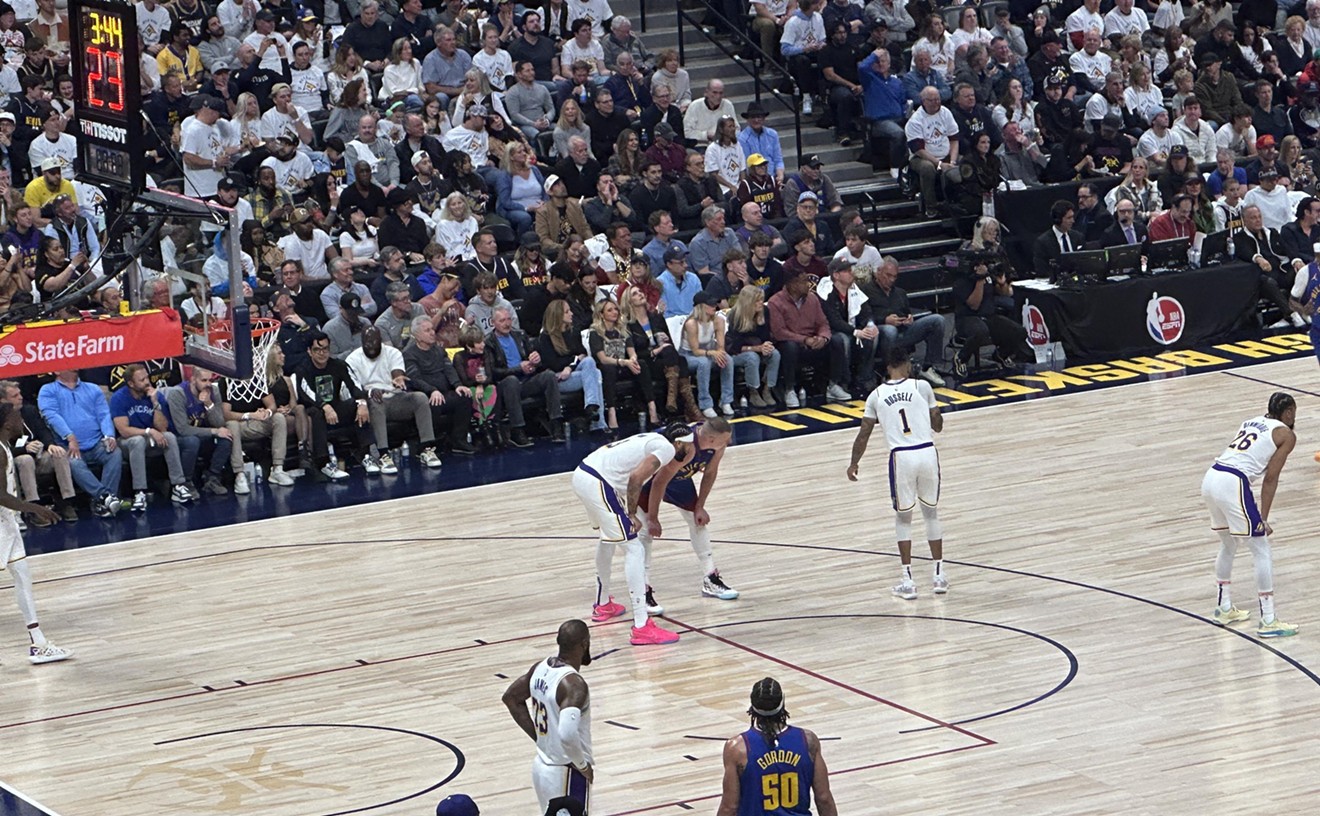She believes officers who knew Jeremy was in the midst of a mental health crisis — including one, CSU Police Department Corporal Phil Morris, who had previously been accused, and later cleared, in an alleged brutality incident — unnecessarily escalated a situation that could have been resolved peacefully, and is upset that officials refuse to release ancillary video that she believes proves her point.
Susan has seen the video and says it shows Morris completely losing control as her son lay dying. "All of his blood is flowing out — he's bleeding out right there on camera — and the officer is still pointing his gun at him and screaming at him to drop his knife."
Cliff Riedel, the 8th Judicial District DA, has ruled that the shooters in the case, Corporal Morris and Fort Collins Police Services officer Erin Mast, were justified in their actions. Moreover, representatives from the DA's office and the CSU police maintain that the release of the video cited by Susan, footage recorded by CSU police officer Katie Aron, is unnecessary, since it doesn't actually show Jeremy's death, only its aftermath, unlike two body-camera clips that were shared with the public last year.
Meanwhile, Susan's prior attempts to get her side of the story out have been met with frustration. Last November, her appearance at a Fort Collins City Council meeting was cut short and she was escorted out by police while the members took a break. That video is also shared here — though the segment showing her expulsion has been removed. Susan takes to the podium just shy of the 42-minute point.
More recently, Susan tried to buy an ad about her concerns in Fort Collins's daily newspaper, the Coloradoan. However, the paper refused to sell her the space. According to regional sales director Shane Morris (no relation to Phil Morris), corresponding via email, "Our editor felt that running Holmes's statement in its entirety would have presented a violation of our terms of service, opening us and Holmes to potential legal risk as a result of its publication."
This is what Susan wants you to know about the events that led up to Jeremy's death, on July 1, 2017.
She describes Jeremy as "an insightful, brilliant person. He graduated from high school with honors and was enrolled to attend Front Range Community College. He was also in the process of designing a computer game with a partner, a good friend of his."
A few weeks before his death, however, Susan reveals that Jeremy had had a bad reaction to marijuana, which he decided to try because he was dealing with chronic pain. Afterward, she recalls, "He said, 'I don't feel right.' He flipped out and got really upset, and the next day, he checked himself into the hospital as an out-patient. He had very high levels of THC in his blood, and it clearly affected him very badly."
Based on online research she conducted after Jeremy's death, Susan believes he suffered from an exceedingly rare condition known as cannabis-induced psychosis. "His eyes never looked right and he had emotional swings. Sometimes he would seem fine, but other times, he would talk about all kinds of weird things. He was never the same after that."

Susan Holmes shortly before she was escorted out of a November 2017 Fort Collins City Council meeting.
These issues came to a head on July 1, when Jeremy became upset that Alex had told him not to visit; Susan said her older son had received several "strange" phone calls from Jeremy when he was in the midst of a major project. At that point, an obviously depressed Jeremy, who Susan thinks had smoked more marijuana, picked up the knife, which was covered by a sheath, and headed on foot to Alex's apartment, located about two miles away from his residence, after saying he was angry and wanted to kill him.
Immediately thereafter, Susan called Alex, who lived at the apartment with his wife, but didn't get an answer. So she phoned the CSU campus police and asked for an officer to be dispatched to Alex's place to warn him and her daughter-in-law not to answer the door if Jeremy arrived. "I also said Jeremy was mentally ill," she says. "I used that term specifically."
CSU police officer Aron was sent to Alex's apartment and spoke to him and his wife there. Her body-camera footage is what Susan wants released, in part because she conveyed the situation in a mental health context.

Susan Holmes carried a sign about her son's death at the Martin Luther King Day parade.
Courtesy of Susan Holmes
Jeremy was indeed nearby, but he never went to Alex's apartment. Instead, he was walking along Prospect Road, on the far side of a six-foot-tall fence that separated him from his brother's place. At that point, Jeremy had the knife in his hand, but Susan stresses that he hadn't threatened anyone or done anything wrong.
Nonetheless, she says, "the CSU campus police officer [Morris] drove up to Jeremy with his lights on — drove up really quickly, as if it was an emergency. He jumped out of his car with his gun, and when he saw that, Jeremy started to act suicidal. He pulled the knife out of the sheath and started waving it around, saying, 'Kill me. Please kill me. I want to die.' The officer kept barking at him to drop the knife, but Jeremy kept walking toward him. He didn't charge him in the beginning. He was just walking, and the officer was backing up."
Then, she goes on, "another police officer, from the city [Mast], drove up, did a U-turn and pulled her gun out. She told Jeremy to drop the knife, too, and that's when Jeremy moved more strongly toward the CSU campus officer, and they started shooting him. They both fired. There were six shots."
Here's a portion of Corporal Morris's body-camera video. Warning: The contents may disturb some readers.
Susan feels strongly that if these officers had treated Jeremy like someone in the midst of a mental health episode rather than a criminal, he'd still be alive today. And she sees the decision to release the body-camera videos associated with Morris and Mast but not the one from Aron as a coverup on the part of District Attorney Riedel. To that end, she filed complaints with the the Supreme Court of Colorado's attorney regulation counsel and the FBI. Nothing came of these efforts.
When contacted by Westword, a representative of Riedel offered this statement about the third video: "The District Attorney's Office was not involved in the release of the body-camera footage. However, Officer Aron was not in the immediate vicinity of Jeremy Holmes at the time of this incident, and her body camera did not capture any of his interactions with law enforcement."
CSU Police Department spokesperson Dell Rae Ciaravola's take, delivered by email, is more detailed. In her words, "All body camera footage of the interaction with Jeremy was redacted and released to the public during a press conference, along with the DA’s finding. CSUPD Officer Aron was not present during the incident; she arrived at the scene some time after the attempts to de-escalate the incident and weapons were fired. She was not present for any interactions between Holmes and the officers. Officer Aron was among officers from both departments who responded after weapons were fired."
Ciaravola adds: "Ms. Holmes was also offered unredacted audio of the body-camera footage of the two officers, one from CSUPD and one from Fort Collins, who interacted with Jeremy. In addition, both agencies worked with her to arrange for a time for her to view the unredacted (she viewed unredacted, at her request) and redacted body-camera footage from those two officers before it was released to the public. Digital redacted footage from the body cameras of the two officers involved in the interaction with Jeremy were made available to media, along with audio of Ms. Holmes calling 911, following a press conference in November."

Police on the scene after the shooting.
CBS4 via YouTube
That Morris remained on the CSU police force after this matter suggests to Susan that the university is "protecting violent officers" — and she also sees a connection between her pursuit of the third video and the recent announcement that university president Tony Frank will be stepping down from his position in June 2019 but will continue to serve as chancellor. None of Frank's statements about his decision allude to Jeremy.
In her son's case, Susan argues that Morris created what's technically known as officer-induced jeopardy. "He approached Jeremy as a criminal instead of the ‘welfare check’ stated by Officer Aron. Dispatch knew that Jeremy had a mental health problem. CSU's officer was told that Jeremy had a mental health problem. She was relaying this info via her shoulder communication to Morris. So why did Morris act so aggressively while Jeremy was just walking down the street? Jeremy was actually leaving the area. Officer Morris was out of control from his first contact with Jeremy until Jeremy’s last breath."
To her, "Jeremy was an innocent nineteen-year-old, a big kid who skateboarded and designed computer games. He was in a mental health crisis from a reaction to cannabis. He never committed a crime in his life."












